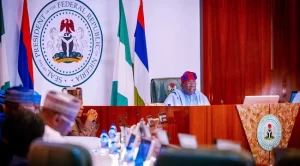
The Federal Executive Council (FEC) has approved a historic N47.9 trillion budget proposal for the fiscal year 2025 as part of its efforts to address inflation, stabilize economic growth, and bolster infrastructure development. The announcement was made during a recent council meeting presided over by President Bola Ahmed Tinubu, where the 2025-2027 Medium-Term Expenditure Framework (MTEF) and Fiscal Strategy Paper (FSP) were also endorsed.
Key Budget Highlights
1. Economic Benchmarks:
Crude Oil Price: Set at $75 per barrel to align with global energy market projections.
Oil Production: Targeted at 2.06 million barrels per day to boost revenue generation.
Exchange Rate: Estimated at ₦1,400 per USD, reflecting current forex realities.
GDP Growth: Projected at 4.6% for 2025, signaling confidence in economic recovery.
2. Spending and Borrowing:
The total aggregate expenditure of ₦47.9 trillion will include a borrowing plan of ₦13.8 trillion, aimed at financing the budget deficit, infrastructure projects, and social programs. While borrowing remains a critical aspect of the budget, the government emphasized the need for fiscal responsibility to ensure sustainable debt levels.
3. Sectoral Focus:
Infrastructure Development: Significant allocations will go toward road construction, housing projects, and power generation to stimulate growth and employment.
Youth Empowerment: Special provisions will target education, skill acquisition, and job creation for young Nigerians.
Social Programs: Continued investment in healthcare, social safety nets, and poverty alleviation programs will ensure inclusive growth.
4. Macroeconomic Stability:
Finance Minister Wale Edun highlighted the role of reforms in stabilizing Nigeria’s economy. Efforts such as reducing oil and gas production costs, improving revenue collection, and deregulating energy prices remain pivotal.
5. Real Estate Investment Fund:
The FEC approved a ₦250 billion Ministry of Finance Incorporated Real Estate Fund to provide low-cost mortgages for Nigerians. The fund aims to address the nation’s 22-million-unit housing deficit while creating jobs in the construction sector
What the Economic Experts are saying
While the proposed budget signals bold fiscal ambitions, economic analysts have urged caution. Some experts warn that sustained borrowing could increase inflationary pressures, given Nigeria’s existing fiscal deficit. They recommend that the government focus on boosting non-oil revenue through tax reforms, diversification, and investment in key sectors like agriculture and manufacturing.
Next Steps
The approved budget will be forwarded to the National Assembly for legislative scrutiny and final approval. The government has reiterated its commitment to maintaining a January-December budget cycle, enhancing transparency and timely project execution.
The ₦47.9 trillion budget proposal for 2025 reflects the Nigerian government’s resolve to address pressing economic challenges while positioning the nation for long-term growth. As the country navigates its fiscal future, prioritizing key reforms and revenue mobilization will be critical to achieving its ambitious economic targets.

